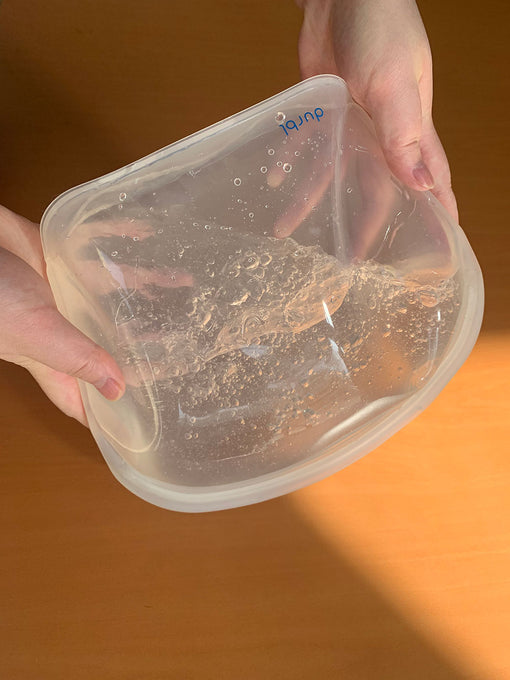
- Article published at:
- Article tag: Sustainability
Drawer menu
The freshness of food is crucial for our health and deliciousness, and the refrigerator is an essential tool to maintain this freshness. So, how can we ensure that the food in the fridge stays in optimal condition for a long time? Here are a few simple and practical strategies that can help you extend the shelf life of your food.
1. Sealing is crucial
Using sealed food storage containers to store your food can effectively prevent the invasion of air, moisture, and odors, which are the main culprits affecting the flavor and texture of food. If you choose more environmentally friendly kitchen supplies, consider reusable food storage containers that are durable and not easily deformed or stained—for example, Durbl collapsible silicone food storage lunch boxes.

2. Silicone bag showcases divine power
Although disposable plastic bags are convenient, they are not environmentally friendly and are prone to breakage, allowing air and moisture that can breed bacteria to enter. Try putting fresh fruits, sandwiches, snacks, or leftovers into Durbl reusable silicone bags and containers to maintain the freshness of the food better.

3. Food also needs to breathe freely
If your family is large or enjoys entertaining guests, inevitably, the refrigerator will occasionally be filled up. But remember, make your ingredients manageable. Too many things in the fridge can hinder air circulation and affect the cooling efficiency of the refrigerator. Ensure your food has enough breathing space to maintain a suitable storage temperature.

4. Understand the secret of ethylene
Ethylene is a gas hormone released as fruits ripen. For example, bananas release ethylene during the ripening process. Although ethylene is not a big problem for bananas themselves, it is a problem for the surrounding fruits. Putting fruits that produce ethylene (such as bananas) together will make surrounding ethylene-sensitive foods (such as leafy vegetables) mature faster.
So, remember to store fruits that release ethylene and vegetables that are sensitive to ethylene separately to avoid ripening too quickly.
A higher humidity environment is their best choice for leafy vegetables, spinach, green peppers, beans, mint, cucumber, strawberry, and all vegetables and fruits sensitive to ethylene or quickly losing moisture. This kind of environment helps to keep them fresh and crispy.

For fruits and vegetables that are prone to producing ethylene and accelerate the ripening of nearby foods, such as apples, pears, apricots, watermelons, cantaloupes, and grapes, maintaining lower humidity is more appropriate to slow down their ripening process and extend their shelf life.
5. Smart use of fresh-keeping drawers
The fresh-keeping drawer provides a slightly different storage environment from other parts of the refrigerator, making it more suitable for storing specific types of food. However, ensure you use it for appropriate food, as improper humidity can cause certain foods to be damaged, mature too quickly, or promote bacterial growth. Adjust the moisture of the drawers appropriately to ensure optimal food preservation.
6.Follow the first in, first out rule
Adopting a first-in, first-out strategy is an excellent way to ensure food is consumed in the order of purchase. Simply put, it means eating the ingredients bought earlier and touching the fresh ones stored in the warehouse.
When replenishing refrigerator inventory, return the newly purchased items and move the old ones to the front. Although it took a little extra effort, it is worth it in the long run.
7.Close the door tightly
It may sound clich é, but it's not a good habit to stand in front of an open refrigerator whenever you hesitate to choose what to eat. Keeping the refrigerator door tightly closed can prevent moisture and warm air from invading, which not only helps prevent bacterial growth but also makes your refrigerator more energy-efficient and efficient. Remember, make quick decisions every time, and then close the door immediately!
8.Check the validity period
Shelf life is not the decisive criterion for determining whether food is still delicious. In many cases, even if food has expired, it can still be safely consumed if appropriately stored, and the taste and quality are almost unaffected. Nevertheless, product date labels provide vital information to help you arrange the ordered ingredients and ensure you consume foods purchased earlier.
9.Optimize your refrigerator environment
A well-functioning refrigerator should be relaxed and dry. But if the device has a problem, it will quickly become a damp black hole, filled with less pleasant flavors and moldy food.
When you find the refrigerator is interior too humid, please first check whether the door seal is intact and whether the ventilation holes are unobstructed.
Many times, simple maintenance or replacement of components can solve significant problems. If these methods still need to be improved, it may be necessary to contact a professional repair service or check the warranty status of the refrigerator.
10.Maximize the potential of refrigerators
Please pay attention to your refrigerator; its function goes far beyond refrigerating various frozen foods. Proper use of the fridge helps you maintain the freshness of your food and effectively utilizes space to store more ingredients.
For example, can many ingredients such as vanilla, chili, tofu, bread, cheese, and protein be frozen and stored to maintain their freshness?
Meanwhile, various sauces and liquids can be frozen, stored, thawed, and used when needed. Transfer them to Durbl's foldable container; your refrigerator can increase efficiency.

Although preservation tips are simple, they are crucial for prolonging the freshness of food, reducing waste, and improving your life. With just a little attention, you can keep the food in your refrigerator in its best condition and contribute to the Earth.